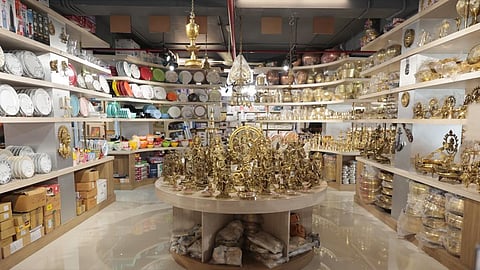

There was a time when brass utensils were common in Kerala homes. From the lamps lit at dusk to the big uruli, these items were part of regular life. And right in the heart of the city, there was a shop everyone knew, a trusted name in households when it came to their favourite nilavilakku, nirapara, or sturdy brass cookware.
Established in 1944 by the visionary P Madhavan Thamby, the shop began with a clear purpose to make high-quality metal utensils accessible and affordable to every household.
“Our shop was one of the first and biggest in Chalai market. Before that, I have heard he was already doing smaller-scale work, but the shop was established in 1944,” says Vipin Gopan, Madhavan’s grandson, who now oversees the business.
After completing his basic education, a 20-year-old Madhavan began a modest brassware business. In those early days, he would walk from house to house, balancing utensils on his head, selling them directly to customers.
In the early days, the stock was sourced from Madras. Madhavan gradually shifted from selling to manufacturing. He soon set up his own factory, Komala Vilasam Metal Industries, in Karamana.
“His factory specialised in crafting utensils from copper and bronze, but his primary clients were temples. He gained widespread recognition for creating traditional lamps, particularly the nilavilakku, which continue to light up temple courtyards across the state to this day,” Vipin says.
“At that time, no one in Kerala was doing this. Everything used to come from Tamil Nadu, and the workers were mostly Tamilians. There were no local workers here. Production in Kerala happened mainly in Mannar, and even today, it continues there. My grandfather was one of the pioneers who began producing these materials locally, from scratch. He also played a significant role in shaping Chalai market into what it is today,” he adds.
A man with practical knowledge, Madhavan even developed an aluminium alloy resistant to corrosion, which later came to be known as ‘Thampy’s Alloy Metal.’
His craftsmanship extended to several important projects, including the sacred 18 steps at the Sabarimala hill shrine, the statue of former chief minister and governor Patton A Thanupillai, and the awards presented at the State Film Awards. The handcrafted 18-foot lamps created by him can be seen in shrines like the Attukal Temple, Sharakara Temple, and Pazhavangadi Ganapathy Temple. His work also adorned the trophies presented at the School Youth Festival.
Madhavan was also conferred the prestigious Udyogapatra award, which recognises self-made entreprenuers for their contributions to the nation’s economic development.
He passed away in 1997, but his legacy continues with the third generation still upholding the same commitment to quality. The small shop has grown into a three-storey showroom, with further expansion through P Madhavan Thamby Home Center in Kesavadasapuram and another branch in Edappally, Kochi.
Even as many similar shops have come and gone around the city, they remain one of the top names in the industry.
“What our generation needs to understand is the quality of work done back then. There were no CAD drawings, precision tools, or metal testing. Yet, structures like the Pathinettam Padi and 18-foot lamp in Attukal Temple have stood strong for over 70 years — no cracks, no damage, no maintenance. It was all based on a craftsman’s skill and calculation. Today, we depend on advanced technology, yet the purity and durability seen back then are rare,” Vipin notes.
“The main reason I can’t go back to production is the shortage of skilled labour. You hardly find Malayalis taking up this kind of work anymore, whether it’s in shops or factories. And production costs have gone up a lot. Back in the day, my grandfather used to customise everything. That kind of craftsmanship is missing now.”
In the past, the shop offered brass, steel and aluminium items. Today, the stores in Chalai, Kesavadasapuram, and Kochi stock everything a kitchen needs — from traditional metals to glassware.
“Interestingly, the demand is now stronger overseas. People in the US, UK, Australia, and Dubai are embracing our traditions, and the sale of idols has gone up in the last eight years,” Vipin adds.
Madhavan’s legacy still lives on in the city, and is felt in the lasting glow of his creations and the trust people still place in the materials, even after all these years.